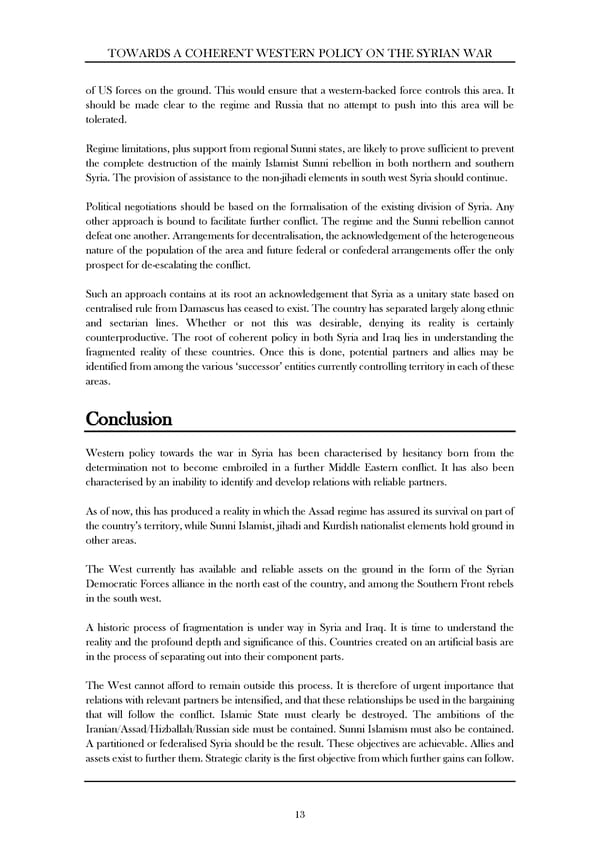TOWARDS A COHERENT WESTERN POLICY ON THE SYRIAN WAR of US forces on the ground. This would ensure that a western-backed force controls this area. It should be made clear to the regime and Russia that no attempt to push into this area will be tolerated. Regime limitations, plus support from regional Sunni states, are likely to prove sufficient to prevent the complete destruction of the mainly Islamist Sunni rebellion in both northern and southern Syria. The provision of assistance to the non-jihadi elements in south west Syria should continue. Political negotiations should be based on the formalisation of the existing division of Syria. Any other approach is bound to facilitate further conflict. The regime and the Sunni rebellion cannot defeat one another. Arrangements for decentralisation, the acknowledgement of the heterogeneous nature of the population of the area and future federal or confederal arrangements offer the only prospect for de-escalating the conflict. Such an approach contains at its root an acknowledgement that Syria as a unitary state based on centralised rule from Damascus has ceased to exist. The country has separated largely along ethnic and sectarian lines. Whether or not this was desirable, denying its reality is certainly counterproductive. The root of coherent policy in both Syria and Iraq lies in understanding the fragmented reality of these countries. Once this is done, potential partners and allies may be identified from among the various ‘successor’ entities currently controlling territory in each of these areas. Conclusion Western policy towards the war in Syria has been characterised by hesitancy born from the determination not to become embroiled in a further Middle Eastern conflict. It has also been characterised by an inability to identify and develop relations with reliable partners. As of now, this has produced a reality in which the Assad regime has assured its survival on part of the country’s territory, while Sunni Islamist, jihadi and Kurdish nationalist elements hold ground in other areas. The West currently has available and reliable assets on the ground in the form of the Syrian Democratic Forces alliance in the north east of the country, and among the Southern Front rebels in the south west. A historic process of fragmentation is under way in Syria and Iraq. It is time to understand the reality and the profound depth and significance of this. Countries created on an artificial basis are in the process of separating out into their component parts. The West cannot afford to remain outside this process. It is therefore of urgent importance that relations with relevant partners be intensified, and that these relationships be used in the bargaining that will follow the conflict. Islamic State must clearly be destroyed. The ambitions of the Iranian/Assad/Hizballah/Russian side must be contained. Sunni Islamism must also be contained. A partitioned or federalised Syria should be the result. These objectives are achievable. Allies and assets exist to further them. Strategic clarity is the first objective from which further gains can follow. 13
 Towards A Coherent Policy On The Syrian War Page 14 Page 16
Towards A Coherent Policy On The Syrian War Page 14 Page 16